Live Reporting
- The US National Football League (NFL) player draft for the 2020 season will go ahead as scheduled next month but players, fans and media will not be present because of the coronavirus pandemic.NFL commissioner Roger Goodell says the draft can serve "a very positive purpose for our clubs, our fans, and the country".The annual event, which allows teams to recruit newly eligible players from the American collegiate system, was attended by 500,000 fans in Nashville last year.This year's draft will be held from 23-25 April in a television studio, with players interviewed via video conference.It was due to take place in Las Vegas. The NFL had already cancelled all public events.
- Health officials say the number of deaths in Spain has risen to 4,858, up 769 in the past 24 hours. The previous day saw 655 deaths. Overall Spain has seen an increase of 7,871 cases in the past day to 64,059. The number of people who have recovered is now 9,357.
- At his press conference on Thursday, Donald Trump said the US was doing "tremendous testing"The BBC's Reality Check team has been fact-checking some of his recent claims, including that "the United States has done far more 'testing' than any other nation, by far".The US has seen a significant rise in coronavirus testing - more than doubling the total in the last few days. According to the latest available data, the US has now tested 540,252 people- that’s almost one in every 600.But this is still some way behind South Korea, which has tested the most people per capita - about one in every 140.You can read more from Reality Check on Donald Trump’s claims about the coronavirus here.
- Every local authority in England has been told by the government to house all of its rough sleepers - as well as people in hostels and night shelters - by the weekend.A letter from Dame Louise Casey, Boris Johnson's housing adviser, tells councils to redouble efforts to ensure everyone is "inside and safe by this weekend" due to the "public health emergency".She says: “These are unusual times so I’m asking for an unusual effort. Many areas of the country have already been able to ’safe harbour’ their people which is incredible. What we need to do now though is work out how we can get ‘everyone in’.”It is important to close down street encampments as they are "high-risk" for spreading coronavirus, Dame Louise says.In a trial last weekend, rough sleepers were put up in about 300 hotel rooms in London.Homeless charity Crisis says the move is a "landmark moment" but questions remain about what support local councils will receive to achieve this."The Government has committed to ending rough sleeping by 2025 - this proves it can be done in 2020 if we make it the priority it deserves to be," says chief executive Jon Sparkes.The Ministry of Housing, Communities and Local Government has not yet commented.
- After six hours of talks, EU leaders - by socially distant video conference - failed on Thursday to agree to share the debt they are all racking up fighting Covid-19, with finance ministers instead reporting back in two weeks' time.The EU is famous for kicking difficult decisions down the road but in coronavirus terms, with spiralling infection and death rates, two weeks feels like an eternity.Spain and Italy - ravaged by the effects of the virus on their populations and their limited public finances - were deeply disappointed.Italy was already one of the EU's most Eurosceptic member states before Covid-19 hit. Italian Twitter was littered with expletives on Thursday - and those were just the posts from politicians.President Emmanuel Macron of France is said to have told leaders the political reaction after the crisis could spell the end of the EU.The thing is, the coronavirus simply highlights already existing, well-known difficulties in the EU.
- "Fifty-eight, widowed, lonely, locked-down, straitened, and fat - but NO ONE can take my kippers."Broadcaster and former pop star Rev Richard Coles, who marked his birthday with a picture of his breakfast on Twitter, is just one of the many people in the UK coping with bereavement while stuck at home alone.Charities say bereavement is often an "extremely lonely and isolating time", but Linda Magistris, from The Good Grief Trust, says the grief of those who are self-isolating may be made worse because of the stress and anxiety brought on by the pandemic.Several people who have recently lost loved ones spoke to the BBC about their own coping mechanisms.
- Firefighters in the UK are planning to drive ambulances, deliver medicines and transport bodies during the "humanitarian crisis" of the coronavirus outbreak.Even though emergency services are already under pressure, "we can and will get through it together," Fire Brigades Union general secretary Matt Wrack told BBC Radio 4's Today programme.A new agreement between fire service organisations will allow firefighters to take on extra duties to support other services, driving emergency vehicles or delivering supplies to vulnerable people."Many fear the loss of life in this outbreak could be overwhelming - and firefighters, who often handle terrible situations and incidents, are ready to step in to assist with body retrieval," Mr Wrack said."Firefighters and control staff have always stepped in when the public has been in danger and this crisis is no different."The deal, which lasts for two months but could be extended, comes as the Metropolitan Police calls for retired officers to rejoin during the crisis.
- The smiling face of a Parisian teenager named Julie A beams from the pages of French websites today. The 16-year-old schoolgirl is the country's youngest victim of the coronavirus.Her sister, Manon, has warned that her death shows that everyone is a risk from Covid-19."Julie just had a light cough last week and it got worse with mucus at the weekend. On Monday they went to see the doctor and that's when she was diagnosed with respiratory distress. She's had no particular illnesses before," Manon told Le Parisien newspaper.Julie was taken to hospital and transferred to the Necker hospital in Paris where she was put on a respirator on Tuesday night. But it was too late to help as her lungs had failed."We've got to stop thinking this only affects the elderly. No-one is invincible against this mutant virus," says her sister.
- The Pakistani government is still reluctant to annoy the religious lobby by ordering a blanket ban on congregational prayers in mosques - even though such congregations have been banned in several Islamic countries amid the coronavirus outbreak.On Thursday, it indicated it may "restrict" mosque congregations, but stopped short of spelling out details.However, the provincial government in Sindh, which has recorded the most cases in the country, has taken the lead by ordering that only up to five people - the prayer leader and mosque staff - could offer joint prayers in a mosque.The restrictions came ahead of Friday congregational prayers which are usually attended by large crowds. They'll be in force until 5 April.Hours later, the government of another province, Balochistan, ordered similar limits on joint prayers until 4 April.The indecision of the federal government, led by Prime Minister Imran Khan, appears to stem from its reluctance to annoy influential professional clerics at a time of the year when they raise donations to run their activities.The present Islamic month, Shaban, and the one to follow, Ramadan, are the time for the faithful to pay Zakat, or an annual Islamic tax. Much of this money finds its way into more than 35,000 religious seminaries run by these clerics across the country.The mainstream Hanafi sect runs the bulk of these seminaries, and has been the most vocal in opposing restrictions on religious gatherings.
- Germany has seen a rise of 5,780 coronavirus cases in the past 24 hours, bringing the total to 42,288, according to the Robert Koch Institute for infectious diseases. The number of deaths has climbed by 55 to 253. Chancellor Angela Merkel has appealed for patience in fighting the outbreak, rejecting calls for a relaxation of restrictions that only came in in several states earlier this week.In France, Prime Minister Edouard Philippe says the epidemic that started in the east is now in the Paris region. Hospitals could reach saturation point around the capital within 24 to 48 hours, according to the Hospital Federation of France. Some 1.2 million residents in the area have left in the past week according to data analysed by mobile phone company Orange. On Thursday evening, officials said France had seen 1,696 deaths, including 365 in the past 24 hours.Crimes in the deserted cities of Italy have plummeted by 64% in March, compared to the same period in 2019, but computer-based crime is rising, the interior ministry warns. That chimes with a new report from EU police agency Europol, which says criminals are focusing on fake sanitary goods, phone scams and cybercrime.Elsewhere:
- After six hours of talks last night, EU leaders agreed to give eurozone finance ministers two weeks to agree a stronger response to the economic crisis caused by the coronavirus. The BBC's Europe Editor Katya Adler assesses the EU's response here
- Russia has now recorded 1,000 confirmed cases and three deaths. It has ordered all cafes and restaurants to close from Saturday and next week has been designated a "non-working week"
- Switzerland has seen 194 deaths since the pandemic began with around 1,000 new cases in 24 hours, according to data collated from the country's cantons
- In Spain, some 9,000 rapid diagnostic tests imported from China have proved defective
- More than 30 million lives could be saved if countries across the globe implement strict measures in response to the spread of coronavirus, researchers from Imperial College London have said.If nothing is done, the world could see 40 million deaths this year, the study suggests - but social distancing could reduce this number by around half.If countries adopt further measures at an early stage - including testing, isolating cases and wider social distancing to prevent transmission to more people - 38.7 million lives could be saved.But the study warns that developing countries are likely to suffer the worst effects of the outbreak.The researchers looked at the health impact of the pandemic in 202 countries using a number of different scenarios, basing their estimates on data from China and high-income countries.
- India is planning to release prisoners to prevent the spread of infection in its overcrowded prisons.The western state of Maharashtra has decided to release on parole 11,000 convicts who have been sentenced to less than seven years. And Delhi’s maximum security Tihar jail will also release about 3,000 prisoners.They include convicts who will be released on parole, and under-trials on temporary bail.Indian prisons are notoriously overcrowded, making them potential virus hotspots. According to one estimate, there are some 400,000 prisoners in more than 1,300 jails. The majority of them are awaiting investigation or trial.Earlier in the week, the Supreme Court asked states to consider releasing all convicts who have been jailed up to seven years to decongest the prisons in a bid to help curb the virus.
- With India in the grips of a national 21-day lockdown, only those performing essential services are being allowed to work.But confusion over what counts as an essential service has led to nearly "five million truck drivers being stranded without food and access to sanitation across the country's highways", according to transport expert SP Singh.Many have been forced to sleep in the back of their trucks as they haven't been able to get back home. Some are also stuck outside factories, unable to offload high-value cargo because of prohibitory orders from local authorities."This could quickly morph into a law and order problem with robberies if the government doesn’t intervene,” says Balmalkit Singh, a transport lobbyist. He urged the government to dispatch food and set up shelter camps for these people.The situation has also disrupted deliveries of food and other perishables. But these interruptions are easing as states slowly allow more movement for essential goods.However, the long-term costs of the lockdown are high. The pandemic is quickly morphing into a humanitarian crisis in India. Several thousand stranded migrant workers have been forced to walk hundreds of kilometres across state lines just to reach their homes.
- UK supermarkets will use a government database of 1.5 million vulnerable shoppers to help prioritise delivery slots.Sainsbury’s and Waitrose say they will begin writing to people on the list next week.There is concern that those most in danger from the virus are going into stores because of a lack of online shopping slots.People in high-risk households have told the BBC they are struggling to get priority treatment online or in stores. Read more here.
- Two MPs and 33 women's rights organisations have written to major hotel chains in the UK asking them to offer beds to domestic abuse victims trapped during the lockdown.In their letter, the group warned of the risk of an "epidemic of abuse" as victims are forced to stay indoors because of home-working, self-isolation and, in some cases, a reduction in job hours. They say domestic abuse rates have tripled in China since the lockdown began there."[Hotels] can make a difference to some of the most vulnerable women who otherwise have no-one to turn to for security, comfort and support," the letter reads.Signatories include Labour MPs Jess Phillips and Carolyn Harris, and groups including Southall Black Sisters and the Jo Cox Foundation.
- Just a day after India's finance minister announced a $23bn (£18.8bn) stimulus package, which critics said was not nearly enough to deal with the economic fallout of the coronavirus outbreak, the central bank has announced a raft of measures to stabilise the economy.The Reserve Bank of India (RBI) cut interest rates by 75 basis points to 4.4% and made it unattractive for banks to deposit funds with the central bank so that they lend it instead.This will help banks reduce their lending rates further and keep credit flowing, economists say."But we also need to remember that currently demand for credit is too weak because of the economy-wide shutdown. Hence, RBI will be required to act aggressively later also when demand starts reviving," Rupa Rege Nitsure, Chief Economist at L&T Finance told the BBC.The RBI also permitted banks to defer interest on working capital repayments and allowed a three-month moratorium on monthly payments for all outstanding fixed-term loans.The relaxed repayment schedule also gives relief for companies facing cash-flow problems, as the deferment will not have an impact on their credit rating nor affect the risk classification of their loan.
- Sports Direct boss Mike Ashley has apologised to the government after saying its shops should stay open during the coronavirus lockdown.He agreed to close its high street stores earlier this week in a U-turn, having previously argued that the company provided an essential service and should stay open.In an open letter, he said he was “deeply apologetic about the misunderstandings of the last few days”.He added: "Our intentions were only to seek clarity from the government as to whether we should keep some of our stores open. We would never have acted against their advice.”Mr Ashley also said that his Frasers Group would offer its entire fleet of lorries to help deliver medical equipment and supplies for the NHS and other key workforces.
- Vietnam has become the latest country to ban large public gatherings.It announced on Friday that indoor gatherings of more than 20 people and outdoor gatherings of 10 people or more would be banned, said a Reuters report.There are currently 153 confirmed coronavirus cases in Vietnam, with no known deaths.The country, which borders China, has been praised for its efforts in containing the disease. Much of this, the government says, is down to contact tracing."The important thing is, you need to know the number of people who might have come in contact with the disease, or returned from pandemic areas, then perform tests on these people," one senior official advising Vietnam's Emergency Operation Centre told the Financial Times.
Video content
- Besides self-isolation, social distancing is also seen as a crucial practice in many countries to prevent the virus' spread.But what exactly is the UK's advice on social distancing? The BBC's Laura Foster explains.
Video content
- Earlier, we reported on Australia's latest preventative measure: all citizens returning from abroad will be quarantined in hotels for 14 days.Over 3,100 cases have now been reported around the country. Several states and territories are in effect locked down. The government has also announced two economic stimulus packages worth A$189bn (£94bn, $109bn).The governmental response has been affecting all Australians - some more than others.


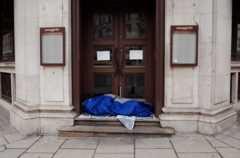



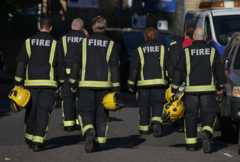

 [INFO LE PARISIEN] Julie, lycéenne de 16 ans, est morte du coronavirus, après avoir été hospitalisée en raison d'une détresse respiratoire
[INFO LE PARISIEN] Julie, lycéenne de 16 ans, est morte du coronavirus, après avoir été hospitalisée en raison d'une détresse respiratoire  «Personne n’est invincible face à ce virus mutant», se désole sa sœur >
«Personne n’est invincible face à ce virus mutant», se désole sa sœur > 

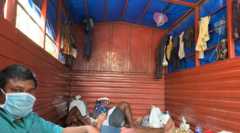
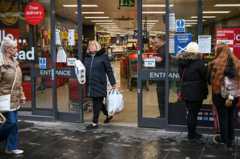
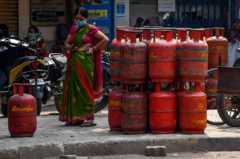

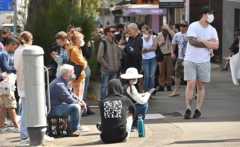
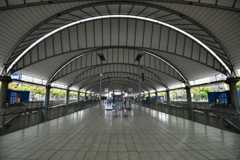
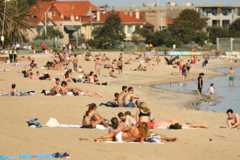
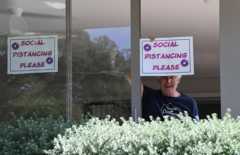
No comments:
Post a Comment